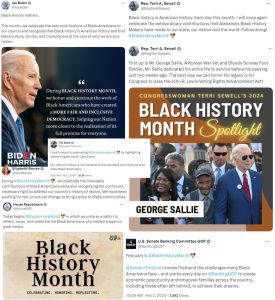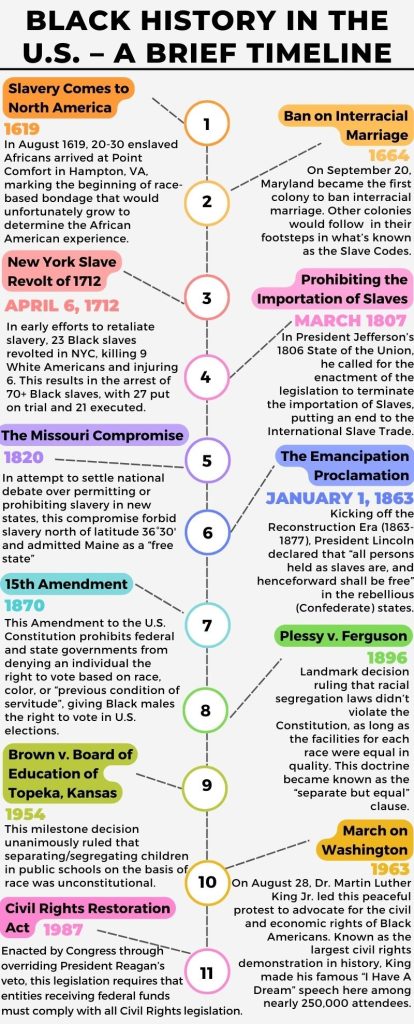Since 1976, Black History Month has been a prominent way to honor the history and achievements of Black Americans, but also to reflect on the struggles and wrongdoings within that history.
“The soul of America is what makes us unique among all nations. We are the only country in the world founded on an idea. It is the idea that we are all created equal and deserve to be treated with equal dignity throughout our lives. While we still grapple today with the moral stain and vestiges of slavery – our country’s original sin – we have never walked away from the fight to fully realize the promise of America for all Americans. Throughout our history, Black Americans have never given up on the promise of America. Unbowed by the forces of hate and undaunted as they fought for centuries against slavery, segregation, and injustice, Black Americans have held a mirror up to our Nation, allowing our country to confront hard truths about who we are and pushing us to live up to our founding ideals. They have helped redeem the soul of our Nation, ensuring the promises in our founding documents were not just words on a page but a lived reality for all people. In the process, the vibrancy of Black history and culture has enriched every aspect of American life.” – President Joe Biden, A Proclamation on National Black History Month, 2024
Around the country, leaders, organizations, companies, and individuals acknowledge and celebrate Black History Month through events, statements of support and action, informative programming on Black changemakers, and more. The Smithsonian Institution has a special landing page for Black History Month 2024, which depicts upcoming events, podcast episodes, arts resources, and general resources pertaining Black History and the celebration of National Black History Month in February 2024. Additionally, the National Museum of African American History and Culture, a Smithsonian Institution, organized an array of events, programs, and tours to honor the African American experience in addition to their year-round informational events and programs that highlight Black History in the U.S. and around the globe. These institutions, along with the Online Catalog at the Library of Congress, are exceptional federal resources for learning more about Black History, especially in honor of Black History Month. See below for insight into what some policy leaders have to say in commemoration of 2024 Black History Month.
History and Background of Black History Month
On February 10, 1976, President Gerald Ford became the first President to officially recognize “Black History Month,” which was built off “Negro History Week” introduced by Dr. Carter G. Woodson in 1926. February was chosen by Dr. Woodson as the time of recognition to honor the birthdays of two distinguished abolitionists – Frederick Douglass and Abraham Lincoln.
In recognition of Black History Month, here are some historic policy measures that contribute to the liberation and ensured equality of Black Americans in the United States:
- 13th Amendment – As of December 6, 1865, slavery was officially abolished. “’Neither slavery nor involuntary servitude, except as a punishment for crime whereof the party shall have been duly convicted, shall exist within the United States, or any place subject to their jurisdiction.’” – 13th Amendment to the U.S. Constitution: Abolition of Slavery (1865)
- Civil Rights Act of 1866 – All people born in the U.S. are now citizens, regardless of race. Enacted by the 39th Congress, this notion, radical for its time, helped to counter the Black Codes.
- Civil Rights Act of 1875 – In response to Civil Rights violations against Black Americans, this ensures “equality before the law” and prohibits racial discrimination in public, guaranteeing all citizens (regardless of color) access to public accommodations and transportation, as well as serving on a jury.
- Civil Rights Act of 1964 – Prohibits discrimination on the basis of race, color, religion, sex, and national origin. Additionally, these provisions extend in cases of labor law and employment pertaining to forbidding discrimination on the aforementioned bases for hiring, promoting, and firing.
- Voting Rights Act of 1965 – Signed into law by President Lyndon B. Johnson, this measure aims to combat the legal barriers (such as poll taxes or literacy tests) from exercising their right to vote as it was granted in the 15th Amendment in February 1870.
- Civil Rights Act of 1968 – Also known as the Fair Housing Act, this law prohibits discrimination in housing (commercial and residential rentals, mortgages, etc.) on the basis of race, color, religion, sex, national origin, familial status, or disability.
Other historic policy measures include The Equal Employment Opportunity Act of 1972, the Amnesty Act in 1872, and the Enforcement Act of 1871, among others. See the attached graphic depicting a brief timeline of other prominent legislative measures and policies in Black History.
Despite these attempts, among others, to grant equality to Black Americans, many policy measures were enacted to repress Black Americans. Some of these harmful measures were undone through positive, radical change in other legislation or executive orders, but several of the measures continue to be seen in areas such as education, health, housing, and crime, due to systemic impacts of racism dating back to the arrival of slaves in the U.S.
Some of these repressive measures include:
- Slave Codes / Black Codes – A series of laws and regulations to restrict various freedoms of slaves, and then Blacks upon slavery’s abolishment. These restrictions were primarily in U.S. Southern states and included prohibition of matters such as interracial marriage, gun ownership, permission to read or sing, or gather in groups without permission.
-
- One of the most infamous of these codes is ”partus sequitur ventrem”, meaning “that is which brought forth follows the womb”. This legal doctrine passed in colonial Virginia in 1662 and defined slavery as a hereditary condition/status from the mother.
- Racial Integrity Act of 1924 – Forbid interracial marriage in Virginia and codified the “One-Drop Rule” stating that any person with even just one ancestor of Black ancestry, is considered Black.
Modern-Day and Current Legislation
Almost 200 years since the abolishment of slavery and over 50 years since prohibiting discrimination, there is an ongoing battle to counter racism. Modern-day responsibilities pertaining equality for Black Americans deals primarily with undoing systemic injustices, but also enforcing measures to address, prevent, and criminalize hate crimes. For example, in 2009, The Matthew Shepard and James Byrd, Jr., Hate Crimes Prevention Act of 2009 became the first statute to allow federal criminal investigation and prosecution of hate crimes. Still, in 2022, H.R. 55 // S. 3710 – Emmett Till Antilynching Act – had to explicitly designate lynching as a federal crime.
While countless measures have been introduced and many have become law since the Emancipation Proclamation, Black Americans have faced a never-ending struggle. From the Early Abolitionist Era to the Civil Rights Era, and still in modern-day America, there is work to be done to truly eliminate discrimination and undo systemic inequities set in place by outdated, prejudiced motives against Blacks.
See below for some of the legislation from the 118th Congress pertaining equality for Black Americans in the 21st Century:
H.R. 703 – Black History is American History Act
Re-introduced on February 1, 2023, by Rep. Joyce Beatty (D-OH-3), this legislation would mandate the inclusion of Black History as a required component of the American History and Civics Academies’ competitive grants administered by the Department of Education (ED). Along with the inclusion of Black History to be eligible for certain grants, Black History must also be included in tests administered by the National Assessment of Educational Progress (NAEP). Rep. Beatty previously introduced the legislation in the 117th Congress and it was initially introduced by Rep. Fudge (D-OH-11) in the 116th Congress. With over 60 cosponsors, H.R. 703 awaits consideration in the House Education and Labor Committee.
“Black history is crucial to understanding the complexity of our nation’s past, present and future—not just slavery and civil rights. By incentivizing schools and educators to teach Black history in the classroom, we can all learn important lessons in our country’s ongoing journey toward creating a ‘more perfect Union’ for all Americans.” – Rep. Beatty, Press Release on 2/1/2023 regarding H.R. 703.
H.R. 1167 // S. 96 – Justice for Black Farmers Act of 2023
This dual-chamber bill, introduced in early 2023 by Rep. Alma Adams (D-NC-12) and Sen. Cory Booker (D-NJ) addresses the history of discrimination in federal agricultural policy. The bill aims to encourage a new generation of Black farmers through U.S. Department of Agriculture reforms, providing debt relief, and creating a land grant program. More specifically, it establishes a USDA equity commission to examine discrimination against Black farmers/ranchers and creates a Farm Conservation Corps to provide necessary skills for socially disadvantaged groups to pursue farming/ranching careers. The bill has 28 cosponsors in the House and 10 cosponsors in the Senate, all of whom are Democrats.
According to a Press Release by Sen. Cory Booker, due largely in part to the history of discrimination, the number of Black farmers in the U.S. has decreased from nearly 1 million in 1920 to less than 50,000 today. “During the 20th Century, Black farmers lost over $300 billion worth of farmland – a loss that further exacerbated the wealth gap for Black Americans. That’s one of the many reasons why I’m proud to reintroduce the Justice for Black Farmers Act, which would enact policies to end discrimination within the USDA, protect the 50,000 remaining Black farmers from losing their land, provide land grants to create a new generation of Black farmers, and restore the land base that has been lost” – Rep. Adams, Press Release on 2/24/2023 regarding the Justice for Black Farmers Act
To learn more about H.R. 1167 // S. 96 and systemic inequities in agricultural policy, read the legislative summaries and bill text on the Leadership Connect product, or visit the National Black Food & Justice Alliance for their supportive analysis of the bill and background on agricultural inequities.
H.R. 40 // S. 40 – Commission to Study and Develop Reparation Proposals for African Americans Act
Re-introduced in January 2023 by Rep. Sheila Jackson Lee (D-TX-18) and Sen. Cory Booker (D-NJ), the legislation establishes the Commission to Study and Develop Reparation Proposals for African Americans. Within the commission, there are several requirements regarding evidence and accountability for discriminatory laws/policies against freed slaves and slave descendants. Most importantly, the commission must recommend ways the U.S. can remedy the effects of slavery and discrimination on African Americans, including through formal apology or compensation. The legislation garners support from only Democrats, with 116 cosponsors in the House and 24 cosponsors in the Senate.
“This legislation goes beyond exploring the economic implications of slavery and segregation but is a holistic approach to reconciling that period of American history. This bill will allow for a moral and social overview of the implications of slavery and the status of African Americans today… America will truly be the beneficiary!” – Rep. Jackson Lee, Press Release on 1/24/2023
H.R. 765 // S. 233 – African American History Act
To kick-off Black History Month in 2023, Sen. Cory Booker (D-NJ) and Rep. Jamaal Bowman (D-NY-16) introduced the dual-chamber legislation known as the African American History Act. The legislation would authorize a program through the National Museum of African American History and Culture to support African American history education programs, including development and circulation of teaching materials, professional development opportunities, and state and school district engagement for interest in adopting curricula. The bill currently sits in respective committees with 121 cosponsors in the House and 10 cosponsors in the Senate, all of whom, are Democrats or Independents.
“An accurate teaching of history is not only vital to our development and well-being as individuals, but also as a nation. Understanding our past provides the ability to make systemic improvements to the lives of all of our citizens, including by eradicating disparities in educational attainment, socioeconomic status, and health care outcomes.” – Endorsement from the American Psychological Association (APA)
Other related current legislation: H.R. 971 – Black History Matters Act, H.R. 727 // S. 215 – National Council on African American History and Culture Act, and H.R. 1244 (awarding a Congressional Gold Medal to Africans and their descendants enslaved in the U.S. from 1619 to 1865).
Current legislative measures regarding minority affairs and systemic inequities offer a glimpse into the progress made since Abolitionist and Civil Rights Movements/Eras. Although, there is still work to be done. While Black History Month is an important time to recognize the invaluable contributions of Black Americans that have shaped our country and its achievements, it’s imperative that we remain aware of committed to reparations and undoing the systemic injustices enacted centuries ago based on immoral discriminations.
About Leadership Connect
Leadership Connect organizes vital legislative data, including a bill’s summary and detailed bill text, along with the bill’s key policy area, sponsor(s) and cosponsor(s), committee assignment, and a Timeline Tracker displaying the bill’s status in the legislative process and any relevant actions in the steps to become law. Uniquely, our product allows users to access the profiles and contact information of staff members on the assigned committee(s), in the office(s) of sponsoring and cosponsoring Members, and those that handle legislative issues relating to the bill itself. Through our product, you gain access to additional detailed information pertaining an office’s past employees and their current whereabouts across sectors, along with current vacancies, and relationship maps to display professional relations between organizations, offices, and individuals.
For more information on our product, including how you can access our congressional and legislative data, as well as staying up to date on our other events and webinars, explore our website.








